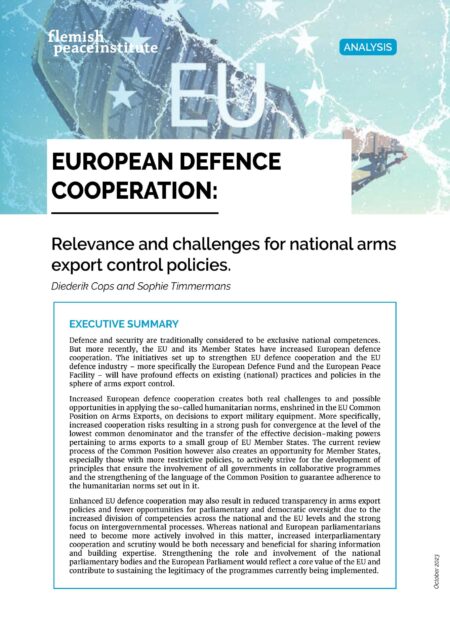European Defence Cooperation: Relevance and challenges for national arms export control policies
Publication date: 24/10/2023
Download the integral version of Diederik Cops‘ analysis here.
Defence and security are traditionally considered to be exclusive national competences. But more recently, the EU and its Member States have increased European defence cooperation. The initiatives set up to strengthen EU defence cooperation and the EU defence industry – more specifically the European Defence Fund and the European Peace Facility – will have profound effects on existing (national) practices and policies in the sphere of arms export control.
Increased European defence cooperation creates both real challenges to and possible opportunities in applying the so-called humanitarian norms, enshrined in the EU Common Position on Arms Exports, on decisions to export military equipment. More specifically, increased cooperation risks resulting in a strong push for convergence at the level of the lowest common denominator and the transfer of the effective decision-making powers pertaining to arms exports to a small group of EU Member States. The current review process of the Common Position however also creates an opportunity for Member States, especially those with more restrictive policies, to actively strive for the development of principles that ensure the involvement of all governments in collaborative programmes and the strengthening of the language of the Common Position to guarantee adherence to the humanitarian norms set out in it.
Enhanced EU defence cooperation may also result in reduced transparency in arms export policies and fewer opportunities for parliamentary and democratic oversight due to the increased division of competencies across the national and the EU levels and the strong focus on intergovernmental processes. Whereas national and European parliamentarians need to become more actively involved in this matter, increased interparliamentary cooperation and scrutiny would be both necessary and beneficial for sharing information and building expertise. Strengthening the role and involvement of the national parliamentary bodies and the European Parliament would reflect a core value of the EU and
contribute to sustaining the legitimacy of the programmes currently being implemented.
 Download PDF
Download PDF

